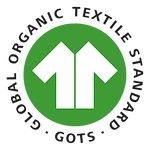- Clothes
- Bags
- Accessories
-
Inspiration
- Shoes

The Global Organic Textile Standard (GOTS) is a certification scheme that has been developed to create a globally recognized standard for organic textiles. GOTS is active in every part of the production chain, from the harvesting of fibres, fair and sustainable production of clothing, to adding the labels to the end product in a sustainable manner.
It is possible for a farmer to become GOTS certified, but it is also possible for a clothing factory to be GOTS certified. A piece of clothing may only bear the GOTS certification label if every part of the production chain is GOTS certified.
GOTS uses two standards:
GOTS Organic: For this certificate, the product consists of more than 95% certified organic material.
GOTS made with x% organic material: For this certificate, the product consists of at least 70% certified organic material.
100% is often difficult to achieve because different materials are used for a garment. A zipper cannot be produced organically, and neither can synthetic material used for stretch.
Find out what's the story behind your clothing by understanding the certificates. Use the scores to discover at a glance what a certificate means in different sustainability areas.
Cotton cultivation uses 6% of all pesticides in the world and 16% of all insecticides
The environmentally friendly conditions of GOTS apply to the different steps in the production process and also to the different materials. Of course, not all conditions apply to every material or production process. Here are some of the conditions that we considered most important.
Score: 4/4 for GOTS organic standard, for the x% this score is of course lower.

The fair trade conditions of GOTS apply to the factories where the clothing and materials are produced, as well as to the farmers. However, it is more difficult to audit the farmers, so the conditions can be taken more strictly for the factories. The main points from the standard are.
Score: 3/4 The social criteria of GOTS are certainly strict, but a living wage is not a condition.

Materials containing animal products (such as wool) must comply with the animal welfare principles, which means good conditions for the animals and in the case of wool means that the wool is mulesing-free.
Score: 2/4 Animal welfare does apply, but it is not necessary to produce without the use of animal products.
Reports are made and suppliers are encouraged to improve on points such as a living wage. However, there are no consequences for not improving. In addition, the reports are not publicly available.
Score: 2/4 There is a report and an incentive for improvement, but there are no consequences if there is no improvement and the reports are not publicly available.
To be GOTS certified a party must meet all the criteria of the GOTS standard (applicable to this party). The audit is carried out by a third independent party such as the Control Union. To remain GOTS certified, the company must be audited every year. Depending on a risk analysis, this may also include unannounced inspections.
Score: 4/4 Checks are carried out annually, even unannounced, and by an independent third party.
Together we can make a difference! Subscribe to the newsletter to stay up to date about fair and sustainable fashion. We plant a tree for every subscription! 🌳